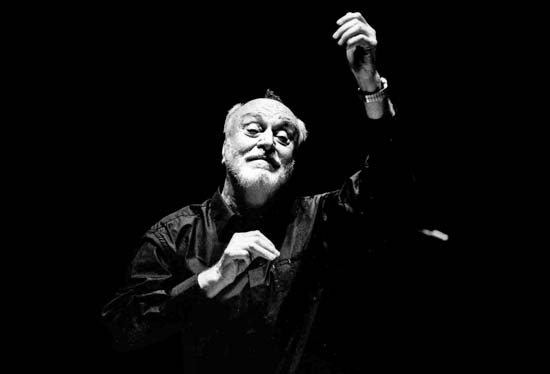Kurt Masur 1927-2015
Kurt Masur, a musician whose discipline, command, and stature returned the New York Philharmonic to the ranks of the finest orchestras in the world, died Saturday at the age of 88 from complications of Parkinson’s disease.
Masur served as music director of the Philharmonic from 1991 to 2002, after wayward years under the leadership of Zubin Mehta. At the time of his appointment, the orchestra was widely seen as a mediocre and inconsistent ensemble, with little relevance, other than its location, in the classical world. At the time of his death, he was the Philharmonic’s music director emeritus.
Born July 18, 1927 in the Silesian town of Brieg (now the Polish Brzeg), Masur–by accident and through his own values and convictions–became a central figure in 20th century history and culture. As a young music student, he suffered a tendon injury that precluded instrumental playing, and so moved on to conducting. He served in the Wehrmacht during World War II, and afterwards began his musical career in East Germany.
His first major post was as conductor of the Dresden Philharmonic, from 1967 to 1972. Beginning in 1970, and for 26 years to follow, he served as Kapellmeister of the Leipzig Gewandhaus orchestra, an ensemble with some of the richest history in European classical music, and possibly the most important institutional keeper of the baroque, classical, and romantic (especially Germanic) symphonic tradition.
In Leipzig, he produced a series of excellent recordings of the symphonies of Beethoven, Bruckner, Mendelssohn, and Tchaikovsky. He also became a figure of considerably important public stature, with an ethical and moral influence on political events. He had an important hand in ushering in the non-violent revolution of 1989, and was floated as a serious candidate for the presidency of post-Communist East Germany.
Masur instead stuck with music, and moved to New York. Not the first choice as new music director (that had apparently been Claudio Abbado, who chose to accept the same position with the Berlin Philharmonic), he ended up being the right man in right place at the right time.
His programming hewed closely to the familiar, central 19th-century symphonic repertoire, while still leaving room for wrinkles, such as opening his very first Philharmonic concert on September 11, 1991, with John Adams’ Short Ride in a Fast Machine. While wishes for more expansive, adventurous programming were a constant during his tenure, Masur focused on the fundamental task, which was rebuilding the orchestra into a group that might meet the demands of high-level symphonic playing, from Beethoven to Berio.
He hired some of the orchestra’s most important current musicians, notably principal cellist Carter Brey, who has been a linchpin of Alan Gilbert’s CONTACT! new music series. And while Masur was never a conductor to divine original interpretations, he brought a sense of ethical and moral commitment to the Philharmonic’s playing, the idea that great music should be played with respect and professional polish, and that through that approach the essential moral value of the music would come through.
And when the time was wrong, at its worst, Masur was the right man, and he and the orchestra showed the societal value of the ethics and morals of great music. On September 20, 2001, he led a nationally televised performance of Brahms’ German Requiem. Forceful, unadorned, plangent, the music making was much more than just a comfort after 9/11, but a bond to connect people recovering a terrible communal experience.
Then a year later, he was on his way, due to conflicts with the orchestra’s board and executive director, Deborah Borda. After New York, Masur was principal conductor of the London Philharmonic from 2000 to 2007, and the music director of the Orchestre National de France, 2002 to 2008. When that latter post ended, he was named honorary music director of the orchestra, and he also held the title of honorary guest conductor—a lifetime position—with the Israel Philharmonic Orchestra.
His influence and importance in New York is ongoing and will last. He left an orchestra to Lorin Maazel and then to Alan Gilbert that, unlike twenty or so years ago, plays at the level, night in and night out, that one expects from the “Big Five” American orchestras. The development of new repertoire under Gilbert has been possible only because the orchestra is once again one of the finest in the country.
Said Gilbert in an announcement from the Philharmonic, “Masur’s years at the New York Philharmonic represent one of its golden eras, in which music-making was infused with commitment and devotion — with the belief in the power of music to bring humanity closer together. The ethical and moral dimensions that he brought to his conducting are still palpable in the musicians’ playing, and I, along with the Philharmonic’s audiences, have much to thank him for.
“I will always be grateful for the support he gave me starting long ago when I was a student. I will miss him deeply.”




Posted Dec 21, 2015 at 12:42 pm by Lawrence A. Johnson
Two concert memories of Kurt Masur.
He was on the podium for the first classical concert I attended, with the Chicago Symphony Orchestra at Ravinia in 1982. The program was standard (Glinka Ruslan, Dvorak New World and Tchaikovsky Violin Concerto with a teenage Nadja Salerno-Sonnenberg) but ideal for a novice metal-head like myself. Though I was on the lawn and couldn’t see him or the orchestra, I was riveted by the music and the performances, and that evening, in no small measure, sparked my eventual career as journalist and music critic.
Masur’s final concert with the CSO happened four years ago. http://chicagoclassicalreview.com/2011/04/masur-cso-scale-the-heights-with-bruckner/ It was clear his health was failing and I think the audience and musicians alike knew it would be his last appearance in Chicago. Yet that performance of Bruckner’s Symphony No. 4 was unforgettable—glorious, spacious and eloquent, with great integrity and an uncommon delicacy and tenderness.